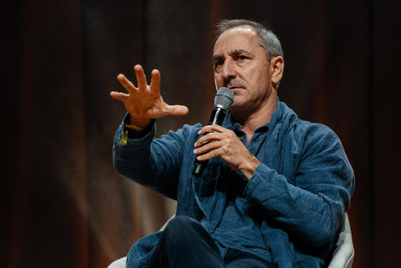.png&h=570&w=855&q=100&v=20250320&c=1)
On the Accenture yacht under the hot Cannes sun, David Droga spoke with his trademark candour. He criticised the “broken” business models of holding companies, over a selective press breakfast and warned that the advertising industry is “collapsing,” as he passes the baton to his handpicked successor, Ndidi Oteh.
For Droga, the industry’s blind pursuit of media buying has become a creative black hole. “That model, which is one of the reasons that the advertising industry is collapsing, is because the pursuit of media has derailed the appreciation of craft and creativity and strategy,” he warned. “That model is going to break. And if we can’t help or be one of the architects that creates a new model, then the platforms will do it without us.”
His criticism of the wider advertising industry was unflinching.
“The problem with most holding companies is they treat creativity like a novelty item,” he said. “It’s tucked away in a box, wheeled out for the pitch. That’s why they’re collapsing, because they’re still obsessed with silos."
David Droga, who founded the celebrated agency Droga5 in 2006 and sold it to Accenture Interactive in 2019 for an estimated $475 million, has spent the past four years growing Accenture Song into a marketing powerhouse with $19 billion in annual revenue. Reflecting on his legacy, he said, “I hope my legacy will be building a team that moves our industry forward and saves creativity. Creativity isn’t just relevant, it’s essential for leadership and innovation.”

Oteh, who is currently Song’s lead in the Americas and a longtime Accenture veteran, officially takes over on September 1, gave the press a flavour of what's to come: “David’s fast. But I’m faster,” she said, drawing laughter from the gathered press and a grin from Droga himself.
She spoke about her vision for Accenture Song, placing speed, integration, and talent at the core of its future. “The world is changing at such a rapid pace, and we have to move even faster to keep up,” she said. “Companies are being forced to completely transform how they work—not in five years, but right now. And we’re here to help them do that.”
She stressed the importance of people in the creative process, even as technology like AI reshapes the industry. “Technology has always been important, and creativity will always be important,” she said. “At a certain point, everyone’s going to have the same tech. What will set us apart are the humans. It will always be a talent business, and that’s where we’re going to thrive.”
Oteh also highlighted diversity as a driver of creativity. “Different voices bring better ideas,” she said. “The most important thing we can do as leaders is create an environment where talent can thrive. That’s how we’ll build the future of this organisation.”
Why Ndidi Oteh and why now?
Droga praised Oteh as the right person to lead Accenture Song into its next chapter. “She’s not a different version of me... she’s her own version, with new energy and new perspectives,” he said.
“That’s exactly what we need right now.”
Droga recalled the moment he first noticed Oteh at an Accenture board meeting, describing her as “magnificent.” He added, “She was so magnificent that I had to ask, ‘Who is this person?’ From that moment, I knew I had to get her on the team.”
“She has the vision, energy, and leadership to take us to the next level. I couldn’t be more thrilled to see where she leads us.”
His decision to step back from the chief executive role is a matter of timing and momentum.
“The best time to hand over is when you know the team is ready to take things to the next level,” he said. “I’ve always believed leadership isn’t about holding on for too long. It’s about knowing when to step away and let new energy take over.”
While Droga is stepping back from day-to-day operations, he will remain involved as vice chairman, focusing on creative and strategic projects. “I get to cherry-pick the things I want to spend my time on,” he said. “Isn’t that the dream?”
Under Oteh’s leadership, Accenture Song plans to expand its global presence, with Brazil and India identified as key growth markets. “We’re not just talking about growth for the sake of it,” Oteh said. “We’re bringing in the best creative talent from every corner of the world and leveraging their voices to drive change globally.”
Oteh also hinted at future developments in media. “We’re absolutely looking at how we operate in a different way, still providing the same level of transparency, still providing the same level of support, but also thinking about how we show up, maybe in a more expansive way in media,” she said.
Droga added that Accenture Song has no interest in replicating traditional media models. “We are not in the business, and we have no interest in being in the business, of the old media game,” he said. “That is not what we want to do. We don't want to be late to the party. That traditional business model, black box, nefarious, blah, blah, blah, that’s going to go away no matter what.”
Creativity: the core
Creativity, once the bedrock of the advertising industry, now increasingly lives on the fringes. It’s a fair observation that the industry focus has shifted: media, data, and specialist agencies are now driving growth, while creative shops struggle to innovate or even stay relevant.
Holding companies often point to the economic challenges of recent years. The penny pinching among tech clients and broader financial upheavels as the reason for their creative agencies’ growth stagnation. While those challenges are real, there’s a deeper problem at play. Creativity, in many cases, has been relegated to the sidelines.
For Droga and Oteh, creativity remains the nucleus to Accenture Song’s mission and it's less about making somehting visually or emotionally compelling, but about solving problems and driving connection.
Droga was forthright about the industry’s failure to protect and nurture creativity. “Creativity is under duress in a bad business model because it’s separated out into these little pockets,” he said. “But the necessity for creativity has never been higher.”
For Oteh, the opportunity to lead Accenture Song is about building on the foundation Droga has created. “David has handed me something in a place of strength,” she said. “Now it’s time to build on that and create something no one expects.”
As the press breakfast inched to a close, Droga addressed the threat of AI and the broader state of creativity across industries. “Most advertising, most marketing, most journalism, most music, most architecture—it’s pedestrian and garbage anyway,” he said. “And it’s written by something worse—scarier than AI. It’s written by compromise and research."
"So if AI is going to come in and replace that ugly, mediocre, middle—great."
A biting critique that's also a call to action.


.jpg&h=334&w=500&q=100&v=20250320&c=1)
.jpg&h=334&w=500&q=100&v=20250320&c=1)

.png&h=334&w=500&q=100&v=20250320&c=1)

.png&h=334&w=500&q=100&v=20250320&c=1)

.jpg&h=334&w=500&q=100&v=20250320&c=1)









